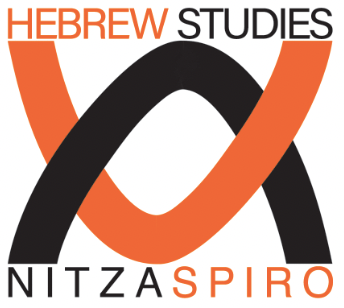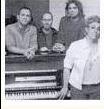HISTORY OF THE NITZA SPIRO HEBREW STUDIES
THE SPIROS’ EDUCATIONAL JOURNEY
For the last 40 years, the name Spiro has become synonymous with the pioneering of new approaches to Jewish education, for all ages including children.
It began with Robin Spiro’s inspirational vision when whilst being a successful businessman and father of a large family he decided together with his wife Nitza, for them to go back to Oxford to take a postgraduate degree in Modern Jewish Studies. During these studies Robin began to realise that by acknowledging the unique millennia – long history of our people, it could make Jewish survival an inspirational topic, and not exclusively for Jews. Many people who are currently indifferent to their identity, perhaps for equating Jewishness with religion rather than with peoplehood in a mainly secular era, could well be attracted to this subject. Robin as an innovating thinker, also understood that the study of this subject could break many anti-Jewish prejudices amongst both Jewish and non-Jewish potential learners.
In 1978, with the enthusiastic support of Avraham Harman, then President of the Hebrew University, the Spiro Institute was offered by the University a three weeks’ intensive tuition for potential Jewish history teachers. It was taught in a specially devised and tutored course, by top Jewish History lecturers at the Hebrew U. The course took place on the campus of the Hebrew University in Jerusalem.
The participants in this intensive course were a group of some 17 people, including two from Beverly Hills High School. All of them were not necessarily trained teachers but professional people who were enthusiastic learners and were determined to pass on their newly acquired knowledge of teaching to both High School students and to adults. This was a remarkable break-through which enabled Robin Spiro to introduce the teaching of a new Oxford and Cambridge Examination Board A/O Level into some 30 schools amongst which were both private and state schools ,e.g. Camden High School for Girls, UCS, City of London for both Girls and Boys, Eton, Harrow…. to name but a few. All classes were attended by approximately 50/50 Jews and non-Jews. This continued with the assistance and guidance of the Spiro Institute for a period of 15 years until the A/O level was removed from the curriculum. The Hebrew University, in recognition of the importance of the revolutionary work of Spiro, provided them with an office space in their building in St. John’s Wood.
The Spiro Institute continued to grow, introducing hitherto unknown educational and cultural ideas such as working with the Open University, preparing with them a course of Jewish history and culture with audio recordings and films which were broadcast on the Open University programs on BBC TV and radio for some fourteen years.
The first ever Jewish film festivals, at the NFT for two successive years again were introduced by the Spiro Institute, who were also responsible for the first ever Israeli Film Festival in this country. It took place at the Everyman Cinema in Hampstead.
The Spiros’ innovative approach to enhancing the understanding of the Jewish heritage included concerts introducing Jewish music and songs from all corners of the world, (Ladino, Hebrew, Judeo Arabic and Yiddish) performed by international artists. These took place years before the establishment of the current Jewish Film Festival, the present Israeli Film Festival or JMI.
Meetings with Jewish top scientists and academics and organising international tours of Jewish interest to some 60 destinations around the world as well as regular visits to institutions and sites around the UK took place on a regular basis.
In those days such programs were total innovations and frequently doubted by many to be effective. But today they have become very much the norm with thousands of people attending such programs regularly in most Synagogues and Jewish Cultural Centres throughout the country.
The Spiro Institute under Nitza’s leadership was also responsible for the extensive Film program presented with debates, lectures and workshops at the ICA situated in Pall Mall. This was part of the major international Holocaust memorial academic and public events under the title of Remembering for the Future, organised and headed by the late Dr. Elizabeth Maxwell. The Spiro Institute continued to grow under the Spiros’ leadership and guidance for over 20 years and gained its international reputation not only in London but throughout the UK as well as in Eastern Europe. In Florida Atlantic University Nitza and Robin were regular annual lecturers for one month a year over a period of some 10 years in the Spring.
Realising the potential of creating a hub of Jewish identity through innovative routes, Nitza decided to resign her university post in exchange for a greater involvement in developing the Spiro vision.
Many subjects were then introduced to this ‘cauldron’, new topics to accompany the teaching of Jewish history: music, history of Jewish food, meeting Jewish top scientists and writers on a regular weekly basis, theatre, films, politics, philosophy, literature, biographies and writings of major Jewish historical figures, Jewish contributions to the world of psychology, Biblical studies, even Biblical Hebrew and deepening the understanding of the prayers. They created the most vibrant and the best Hebrew language courses outside Israel recognised as such, in writing, by the Israeli heads of teaching of the Hebrew language in Israel and in the diaspora at the Ministry of Education. To achieve this status Nitza was greatly assisted by a large team of talented, dedicated and loyal teachers. Hebrew intensive Ulpanim with a difference were created, both in London and in Kibbutz Lavi in Israel. These developed intending to give students much beyond the practical use of the language. The love for the Jewish language and the treasures it carries taught through imaginative methods which made people who doubted their ability to acquire a new language, believe in their ability – and love the process. In the quest for reviving the love for Mama Loshen (Yiddish), the Jewish language spoken in Eastern and Central Europe.
The Spiros were greatly helped by the well-known actor Anna Tzelniker whose biography which described the history of the Yiddish Theatre as well as her own, under the title Three for the Price of One was published by the Spiro Institute. In addition to a Yiddish speaking club which was meeting one Sunday every month, they have also created a Hebrew speaking club where Hebrew learners and native Hebrew speakers met weekly, enjoying inspiring Hebrew programs.
The Spiro Institute has bravely created a Yiddish Theatre in a community that by and large does not understand Yiddish. Surprisingly it attracted many viewers at quite a number of shows. It dissolved only after the passing of its main actors and directors Harry Ariel and Bernard Mendelovich. The Spiro Institute hosted the Gilbert and Sullivan Yiddish theatre from the USA who played for five nights to full houses at the Rudolf Steiner Theatre in Baker Street and attracted both Jews and Gilbert and Sullivan fans.
Nitza and Robin left the Spiro Institute in 1999. They have resigned but did not quit. They believed then as they do now that each person is born for a purpose which they ought to fulfil or at least work on throughout their lives. While working to achieve it no one is under the illusion that it is possible to fully accomplish it, but as our sages taught “we are not at liberty to abandon it.”
When Nitza and Robin resigned from the Spiro Institute they were ready and determined to embark on a new route to take their vision to new heights.
It is never easy to carve a fresh path to a peak when one has already been there. But the difficulty has its rewards too: Making sure not to lie on old laurels but to introduce new ideas to meet new challenges in an innovative and creative way, and learning to do it with limited resources!
The name Spiro Ark chosen for the newly formed entity was inspired by the fact that Ark is a term which has a significant dual meaning:
1)The Ark of the Covenant which reflects our bond to our history shared by us all and to the spiritual values which unite us .
2)The Ark also represents Noah’s Ark of physical survival. Our history teaches us that in every generation we are subject to threats symbolised by the deluge. Yet, we have miraculously survived as a people. The Spiros have as their motto: ”My people is destroyed for LACK OF KNOWLEDGE” (Hosea 4:6)
Should the Spiros now retire?
Age is a mere number, it is the spirit and vision that counts.




